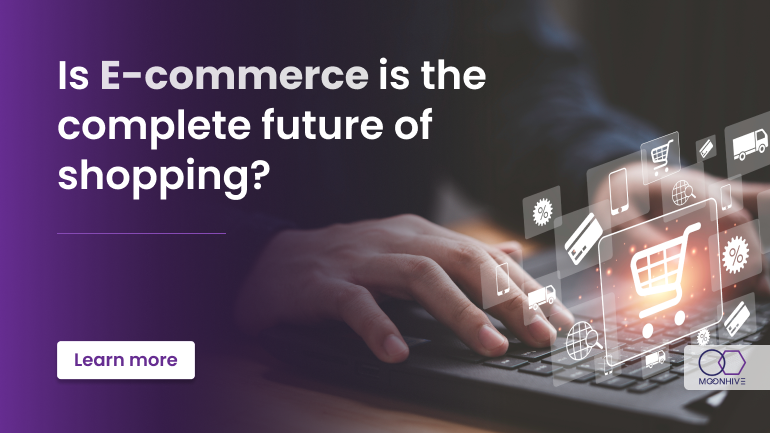Is E-commerce the complete future of shopping?
E-commerce (or electronic commerce) in simple laymen’s terms can be defined as the process of buying and selling goods or services, or transfer of funds or any kind of data over a network, most probably the internet. These can be termed as business transactions that happen digitally. They can be for B2B (Business to Business) or B2C (Business to Consumer) transactions.
E-Commerce, or in other words, digital shopping has definitely come a long way since its inception about two decades ago. It is now on par with any other enterprise; with customers increasing in large numbers day by day. According to a survey on world digital trends, global e-commerce sales are touted to be more than 6 trillion in the first half of 2023 alone. Hence, proving it to be a lucrative choice for a lot of businesses, opening new growth opportunities and revenue streams.
ECommerce has always been an ever-changing, ever-evolving industry, where trends are constantly shifting, and ever since the pandemic, there has been a gigantic rise in the number of e-commerce platforms and their customers; revolutionizing how buying, selling, and marketing works. From websites to apps, e-commerce services have spread like wildfire for the past three years.
Let’s look at the pros and cons of an eCommerce Venture.
Advantages
Convenience:
eCommerce effortlessly allowed businesses to go far and wide and reach customers from all over the world and expand their market, increase sales, and therefore, generate more revenue. It also enabled customers to purchase and shop anything they want from anywhere in the world, at any time. Moreover, they can even opt for a variety of payment methods, such as Cash-On-Delivery (COD), Net Banking, or Card Payment. In some cases, eCommerce websites allow customers to go for the “buy now, pay later option”.
Analyze Consumer Behavior:
E-commerce websites use various techniques to lure customers, such as pay-per-click, search engine optimization, etc… through which they use and employ different trafficking methods and techniques to get an insight into the psychology of the customer and collect data such as keywords, requirements, purchase history, the overall pricing strategy, etc…
Personalized Shopping Experience:
ECommerce businesses provide a personalized shopping experience for the customer, therefore can increase customer loyalty for many such eCommerce websites and platforms. Personalization can include a seamless online shopping experience, targeted communications, product recommendations and discounts, and even various payment options.
24/7 Accessibility:
An eCommerce enterprise is not a 9 am to 9 pm as compared to a brick-and-mortar store. It’s a business that runs 24/7. Hence it allows customers the freedom and flexibility to shop from its website or app at any time of the day.
Cost Effective:
ECommerce takes away the added cost that comes with running a regular, physical store, such as rent, facilities, and staff.
Collecting Data:
eCommerce allows businesses to track, collect and analyze consumer data, which can be later used to improve marketing strategies and customer experiences.
Customer Loyalty:
As mentioned earlier eCommerce businesses can build & expand their customer base and increase customer loyalty by providing them with a seamless shopping experience, and personalized recommendations, offers, and other discounts.
Product Information:
ECommerce websites and mobile apps always provide a detailed description of the product that the customer is interested in, including, date of manufacture, expiry, prices and offers and discounts.
Disadvantages
Need for Access to the Internet:
This might be an obvious disadvantage, but it is something that must be highlighted. Unlike traditional, physical stores, you need the support of high-speed connectivity to access different eCommerce platforms and its many features; including purchase and payment. And for the best consumer experience.
IT Security Issues:
On the web, nothing is safe! This applies to eCommerce platforms as well, many such conglomerates, organizations, and businesses have been reported to have become vulnerable to severe data theft and cyber-attacks, where sensitive information of their customers was stolen from their databases. Not only could this have long-lasting implications for the customer, but it could also put an irreversible dent in the trust and goodwill of the business.
Credit Card Fraud:
Another grave issue when it comes to eCommerce businesses that need to be looked upon with serious concern is Credit Card Fraud. It is a problem that is growing bigger and bigger for various online businesses. Most Credit Card fraud cannot be traced backward, and it can further lead to huge monetary loss, other revenue as well as a bad reputation for both the customer and the business.
Lack of Quality:
In an online eCommerce platform, a glossy, pictural representation of a product cannot guarantee its usability and moreover, quality. Therefore, customers are often found deceived and cheated when they receive the final product. As a matter of fact, there exists a lack of transparency between the buyer and the seller at any given point in an eCommerce platform.
